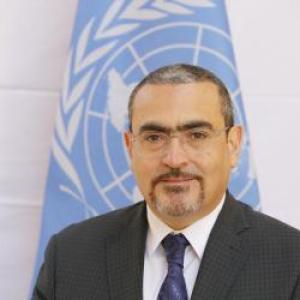UN Resident and Humanitarian Coordinator remarks for the International Day of Peace
Endemin Aderachihu!
Good morning, ladies and gentlemen,
It gives me great pleasure to join you for the annual commemoration of the International Day of Peace. I am especially pleased that so many young people have joined our gathering today.
Peace is a noble and necessary pursuit, and the only practical pathway to a better, fairer world for all people.
Yet in too many places, in too many contexts, we are failing the cause of peace.
The theme of this year’s International Day of Peace “Actions for Peace: Our Ambition for the #GlobalGoals” reminds us that there is no peace without development and no development without peace as we are marking the mid-point in implementing the Sustainable Development Goals.
Ladies and gentlemen,
Eight years ago, Member States adopted the Sustainable Development Goals making a solemn promise to the people of this planet: A promise to build a world of health, progress and opportunity for all.
Yet, at the midpoint on our way to 2030, the Sustainable Development Goals are in deep trouble. Only 15 per cent of the targets are on track and many are going in reverse. Instead of leaving no one behind, we risk leaving the SDGs behind.
According to the Special Edition of the 2023 SDG Progress Report, under current trends, 575 million people will still be living in extreme poverty in 2030, and only about one third of countries will meet the target to halve national poverty levels. Shockingly, the world is back at hunger levels not seen since 2005, and food prices remain higher in more countries than in the period 2015–2019.
As of the end of 2022, 108.4 million people were forcibly displaced worldwide – an increase of 19 million compared with the end of 2021 and two and a half times the number of a decade ago.
Ongoing and new violent conflicts around the world are derailing the global path to peace. Alarmingly, the year 2022 witnessed a more than 50 per cent increase in conflict-related civilian deaths.
The figures are shocking, but they clearly show the urgent need for renewed global and national commitments towards ensuring peace, security and sustainable development.
Ladies and gentlemen,
Last week world leaders gathered in New York to mark the mid-point of the 2030 Agenda for Sustainable Development. At the Summit, leaders adopted an action-oriented political declaration at the Summit, highlighting their collective commitment to build a better, healthier, more peaceful, sustainable and prosperous world by 2030.
We now need to translate this at the national level. We all – including the UN, government, civil society, academia, the private sector and media - have a role to play to accelerate actions to achieve the SDGs and deliver on the commitments with a clear sense of urgency in the country.
I am very encouraged to see many youths from different walks of life at today’s celebration. Youth are an essential component if we are to create momentum to rebuild and sustain the peace in this country. Today’s generation of youth is the largest the world has ever known, and that young people often form the majority of the population of countries affected by armed conflict.
The youth can and should act as advocates for peace, including in the prevention and resolution of conflict, by influencing public debate and dialogue with decision makers at the local, national and international levels as well as by disseminating messages of peace or addressing misinformation and hate speech campaigns through social media or when directly involved and engaged in processes.
Ladies and gentlemen,
Across the world, there are many initiatives towards advancing peace, but fostering the culture of dialogue is the foundation and at the center when we look at the ones that result in positive outcomes.
Dialogue is the right path to achieve the very peace that is in everyone’s interest.
Dialogue is an essential ingredient for building consensus among people who have different views and mobilizing their collective efforts towards an inclusive, rights-based, sustainable development which is the best defence against the risks of violent conflict.
That is why we put dialogue at the heart of the commemoration of the Peace Day here today. This is also in line with our commitment to accompany Ethiopia on its journey towards resolving differences through national dialogue.
I hope today’s event will serve as a platform for discussing a range of issues that are critical to fostering the culture dialogue in Ethiopia and finding sustainable solutions to multiple challenges of the country.
On behalf of the UN Country Team in Ethiopia, I would like to express the UN’s unwavering commitment to continue supporting the aspirations of the people of Ethiopia to achieve durable peace and sustainable development.
Before closing, let me express my gratitude to the UN Association in Ethiopia and Talent Youth Association for partnering with us in organizing this event and to all members of the panel and participants for joining us here today to commemorate this important Day.
I thank you!
Speech by


















